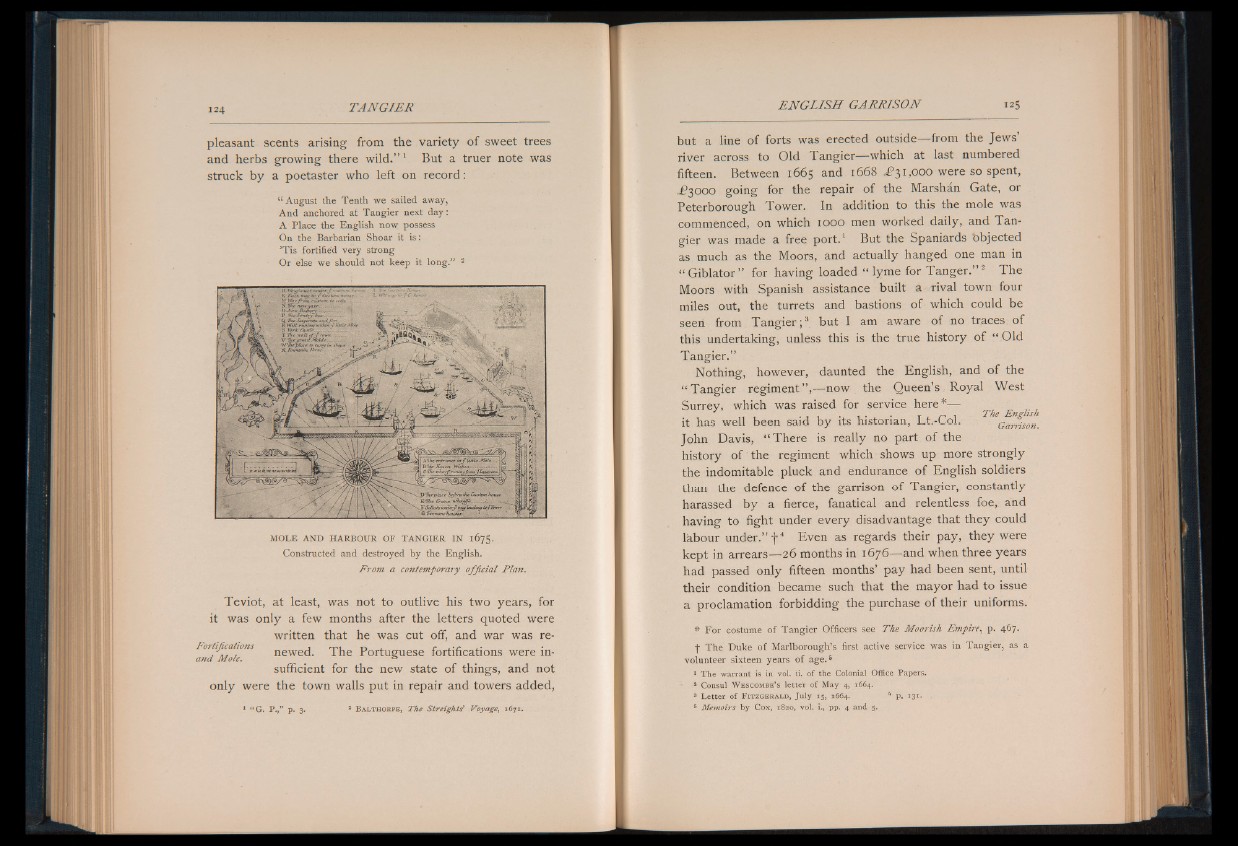
pleasant scents arising from the variety of sweet trees
and herbs growing there wild.” 1 But a truer note was
struck by a poetaster who left on record:
w August the Tenth we sailed away,
And anchored at Tangier next day:
A Place the English now; possess
On the Barbarian Shoar it is :
’Tis fortified very strong
Or else we should not keep it long.” 2
MOLE AND HARBOUR OF TAN G IER IN 1 6 7 5 .
Constructed and destroyed by the English.
From a contemporary official Plan.
Teviot, at least, was not to outlive his two years, for
it was only a few months after the letters quoted were
written that he was cut off, and war was re-
Fortifications , rr-.i -n . c i - r .•
and Mole newed. The rortuguese fortifications were in-
sufficient for the new state of things, and not
only were the town walls put in repair and towers added,
1 “ G. P.,” p. 3. 2 B a l t h o r p e , The Streights' Voyage, 1671.
but a line of forts was erected outside— from the Jews’
river across to Old Tangier— which at last numbered
fifteen. Between 1665 and 1668 ^31,000 were so spent,
£ 3 000 going for the repair of the Marshan Gate, or
Peterborough Tower. In addition to this the mole was
commenced, on which 1000 men worked daily, and Tangier
was made a free port.1 But the Spaniards bbjected
as much as the Moors, and actually hanged one man in
“ Giblator ” for having loaded “ lyme for Tanger.” 2 The
Moors with Spanish assistance built a rival town four
miles out, the turrets and bastions of which could be
seen from Tangier;3 but I am aware of no traces of
this undertaking, unless this is the true history of “ Old
Tangier.”
Nothing, however, daunted the English, and of the
“ Tangier regiment” ,— now the Queen’s Royal West
Surrey, which was raised for service here*—
. . . . , , • , • • t l /—i 1 Hro English it has well been said by its historian, Lt.-Col. Garrison.
John Davis, “ There is really no part of the
history of the regiment which shows up more strongly
the indomitable pluck and endurance o f English soldiers
than the defence of the garrison of Tangier, constantly
harassed by a fierce, fanatical and relentless foe, and
having to fight under every disadvantage that they could
labour under.” f 4 Even as regards their pay, they were
kept in arrears— 26 months in 1676— and when three years
had passed only fifteen months’ pay had been sent, until
their condition became such that the mayor had to issue
a proclamation forbidding the purchase of their uniforms.
* For costume of Tangier Officers see The Moorish Empire, p. 467.
f The Duke of Marlborough’s first active service was in Tangier, as a
volunteer sixteen years of age.6
1 The warrant is in vol. ii. of the Colonial Office Papers.
2 Consul W e s c om b e ’s letter of May 4, 1664.
3 Letter o f F i t z g e r a l d , July 15, 1664. ** p. 131.
5 Memoirs by Cox, 1820, vol. i., pp. 4 and 5.